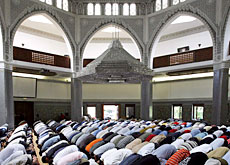
OSCE expert concerned by Swiss Islamophobia

The Swiss Muslim community is better integrated than those in other European countries, but suffers from an "acute perception problem", says an Islamophobia expert.
Turkish diplomat Ömür Orhun, the representative of the Organisation for Security and Cooperation in Europe fighting intolerance and discrimination against Muslims, was speaking at the end of a three-day visit to Switzerland.
Under his OSCE mandate, Orhun was invited by the Swiss authorities to gain a better understanding of the situation and expectations of Muslims living in Switzerland.
Addressing a news conference in Bern on Wednesday, Orhun said the Swiss Muslim community was relatively better off as far as education and financial status were concerned, but there was a major issue regarding perception.
“The mainstream Swiss population has a growing apprehension of Muslims in the country which leads to a sense of fear in the Muslim community of not being welcome, alienated and rejected,” he explained.
“The perception problem of mutual fear and anxiety between the non-Muslim and Muslim communities could be easily corrected by small gestures provided there is goodwill on both sides. Otherwise this fault line could further increase in the future,” he told swissinfo.
Orhun said one way of building confidence and acceptance might be for the cantons to put Islam on the same footing as for example Christianity and Judaism.
“The Muslim community is asking why we are not being given the same opportunity when a much smaller community is accepted as a religion,” he explained.
Other recommendations would be to establish purpose-built places of prayer and places of burial.
“They don’t have many wishes but these small gestures could further understanding,” he said.
Astonishing developments
Orhun also criticised political initiatives such as the rightwing Swiss People’s Party campaigns to force nationwide votes on banning the construction of minarets and on expelling criminal foreigners, which he said were “creating a very bad atmosphere”.
In June 2007 the Turkish diplomat said he was “astonished” that such developments were taking place in a country like Switzerland, which had been “an advocate of protection of human rights elsewhere in the world”.
Orhun said his attitude hadn’t changed since his visit, but he was glad that the people he spoke to held similar positions to him.
“Now the elections are over I hope there will be more quietness and a responsible attitude to handle this initiative,” he declared.
“Minarets are an integral part of mosques, as bell towers are parts of churches. And both of them are humanity’s common heritage,” he said.
Disproportionate
Orhun added that Muslims moving to Switzerland were disproportionately affected by Swiss immigration laws and regulations.
“There has been international criticism that some Swiss laws are discriminatory, especially the 2006 Aliens or Foreigners Act, creating two tiers of naturalisation and family reunification,” he explained.
The OSCE representative has already carried out ten similar visits to other countries in Europe, including Britain, France, Spain, Norway and Denmark, and plans to submit his report on Switzerland early next year.
His “well-rounded” programme included meetings with senior officials at federal and cantonal levels, representatives of the Muslim community and cabinet ministers Pascal Couchepin, Micheline Calmy-Rey and Christoph Blocher.
Earlier this year Switzerland was accused of discriminatory tendencies in a hard-hitting report by the United Nations special rapporteur on racism, Doudou Diène.
He accused the authorities of a lack of any “coherent and resolute political and legal strategy against racism and xenophobia”.
In reaction, the government said it agreed that racism was a problem and added that it was aware that more had to be done at the federal, cantonal and communal levels.
swisssinfo, Simon Bradley
The Organization for Security and Co-operation in Europe (OSCE) is a pan-European security body of 56 participating countries. It deals with three dimensions of security – the politico-military, the economic and environmental, and the human.
In 2004 the OSCE decided to appoint three personal representatives who support its work to promote tolerance and counter discrimination.
Ömür Orhun has worked part time for the past three years as an OSCE ambassador in combating intolerance and discrimination against Muslims. He was head of the Turkish Delegation to the OSCE for four years from 2000 to 2004. Two other representatives are promoting the fight against anti-Semitism and discrimination against Christians.
Orhun visited Switzerland from November 12-14 on behalf of the Spanish chair of the OSCE and met the relevant authorities at federal, cantonal and communal levels, as well as representatives from Muslim communities.
Muslims are the largest religious group in Switzerland after the Christian faiths.
The 2000 census showed their numbers had more than doubled over the previous decade to 310,000. It is estimated that this figure now stands at around 340,000.
The rightwing Swiss People’s Party is currently campaigning to ban the construction of minarets in Switzerland.
In Switzerland, only the mosques in Geneva and Zurich have a minaret but they cannot issue the call to prayer. In addition there are around 150 “centres of worship” mainly in warehouses and old buildings, according to the Federation of Islamic Organisations in Switzerland.

In compliance with the JTI standards
More: SWI swissinfo.ch certified by the Journalism Trust Initiative
































You can find an overview of ongoing debates with our journalists here . Please join us!
If you want to start a conversation about a topic raised in this article or want to report factual errors, email us at english@swissinfo.ch.